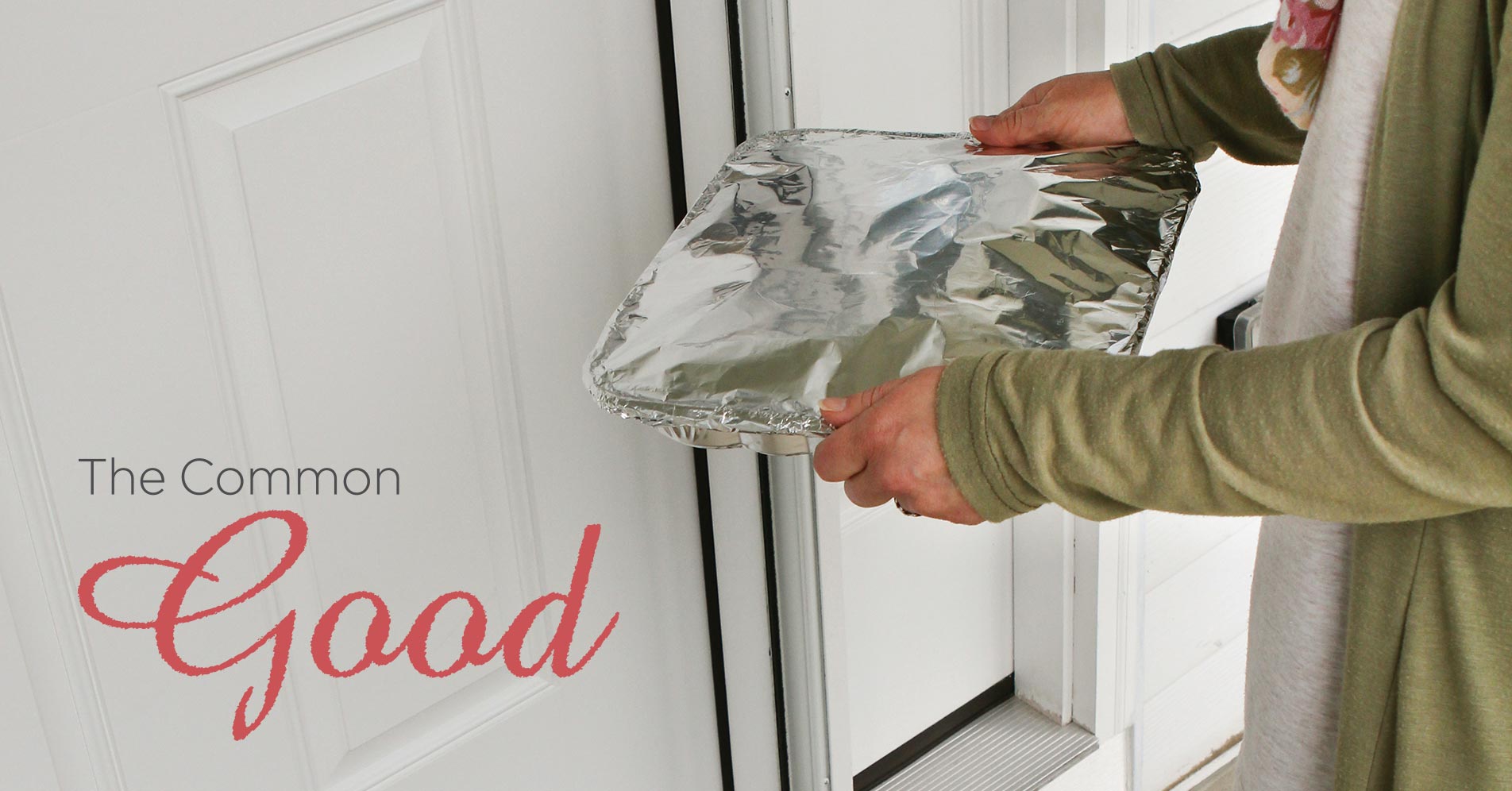
 The term “the common good” is used so often that perhaps we are certain we know what it means.
The term “the common good” is used so often that perhaps we are certain we know what it means.
Until we stop and think about it and try to say what it means. Then most of us are stumped.
A recent survey about Catholic’s awareness of Catholic social teaching concludes that “Common good, the second most resonating term we’ve researched, is among the least well understood terms we’ve researched.
“Only about 10% of Catholics and 5% Non-Catholics correctly identify the definition of Common Good. Notice that 85% of Catholics are convinced that they know what this term means, yet 75% of them get the answer wrong.” Faithful Measure: Gauging Awareness of the Catholic Church’s Social Doctrine, Andreas Widmer and Catherine Pakaluk
While the term originated in Catholic social teaching, it has been “borrowed” for all types of uses and purposes – some of which actually end up muddling the real meaning.
So what is the definition of the common good?
“By common good is to be understood ‘the sum total of social conditions which allow people, either as groups or as individuals, to reach their fulfillment more fully and more easily.’ The common good concerns the life of all. It calls for prudence from each and even more from those who exercise the office of authority.” Catechism of the Catholic Church 1906
And lest you think somehow that definition gets you off the hook – that it is someone else’s responsibility – the catechism also says this, “the dignity of the human person requires the pursuit of the common good. Everyone should be concerned to create and support institutions that improve the conditions of human life.” CCC 1926
“Too often we think that responsibility for the good of the community — whether it be our parish, our neighborhood, our town, etc. – lies only with those who are ‘in charge’: our pastor, our political leaders, and so on,” said Dr. Chris Burgwald, director of adult discipleship and evangelization for the Diocese of Sioux Falls.
“The reality is that each one of us is called to do our part to care for the common good of our various communities, according to the role that we play. Simply as members of a community we have a responsibility to enhance and deepen the good of that community,” Burgwald said.
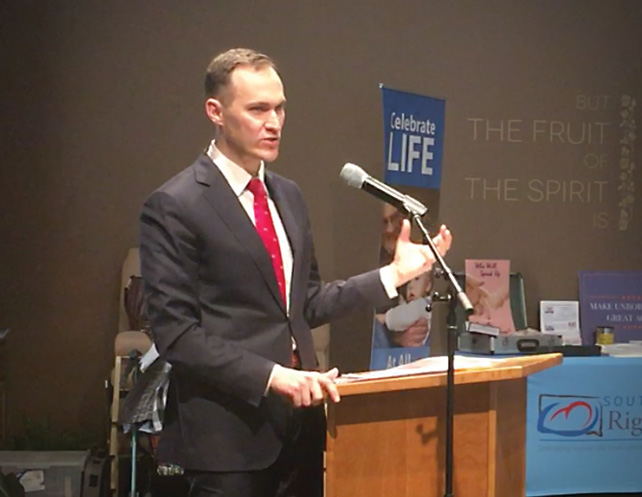
Chris Motz, executive director of the South Dakota Catholic Conference cites St. Thomas Aquinas, saying it is desirable that the common good be “willed and intended.”
“…in other words, we have to want it and work for it,” Motz said.
“Oftentimes, it’s easier to desire and work for the good of ourselves and our immediate families; i.e., I take seriously my responsibility to provide for the needs of my family and the formation of my kids. This is great. But it doesn’t stop there. As citizens, ‘We the People,’ we are the only ones responsible for the ordering of our life together. The common good is the goal of this ordering,” he said.
“It sounds basic, but that’s the reason we expect our elected leaders to serve the good of the citizens, not themselves. They serve everyone, not their own personal interests. Our leaders have the authority to do so because we’ve delegated it to them. However, responsibility always remains ours,” said Motz.
The common good doesn’t stand alone, but rather is among the factors that leads to a healthy human community.
“The principle of rights and responsibilities must be reflected on in light of the common good,” said Joe Rutten, Mount Marty College Benedictine Leadership Institute director.
“What responsibilities do individuals and communities have toward providing for the rights of others and the achievement of the common good in society? I think by nature of our brokenness we are quick to point to someone else to do the work of providing for others. We are selfish people and consideration of the common good for others usually requires that selfishness to be set aside.
“This is why Christian charity is so important. It literally takes God’s divine action of charity within our lives to empower us to overcome ourselves to serve our fellow brothers and sisters. There is certainly a role for government agencies at all levels to make sure that the common good of communities are being addressed, but I believe that the primary place that that responsibility lives is within the minds and hearts of us as individuals and those we live in close proximity with,” he said.

“I think the Bishop Dudley Hospitality House is a perfect example of this. It wasn’t the result of the city or the state or the federal government. It was the result of men and women of faith, coming together to meet the needs of those in our community that are looking for some very basic conditions to be met so that they could have an opportunity to find success and to flourish in their lives,” Rutten said.
The truth is that while we may not offer a definition or even understand how it relates to our actions, most of us act towards the promoting the common good on a regular basis in our families, parishes, communities and other organized aspects of our lives.
We seek ways to help others reach their fulfillment.
We act so that others can achieve their goals.
We give to allow some aspect of one of these communities to thrive.
Each of these contributes to the common good – enhancing the social conditions which allow people, either as groups or as individuals, to reach their fulfillment more fully and more easily.
“To get concrete regarding the common good, ask yourself the question, ‘What is good for us?’ or maybe, ‘What is good for us right now?’ and then act on it,” Burgwald said.
“If we take a neighborhood as an example, what is good for it at the moment might be a block party that deepens relationships among neighbors. At another moment what’s good for the neighborhood might be to mow the lawn or shovel the snow for an ailing neighbor.
“In the case of a family, today it might be an afternoon hike or an evening of card games, while tomorrow it might be a visit to a soup kitchen or homeless shelter. There are innumerable possible answers to that simple question… the key is to ask and then answer it,” Burgwald said.
Parishes all over the diocese actually thrive because of this. Through events, sacramental celebrations, and responses in times of need, people are living out the Gospel and promoting the common good.
“In my five-plus years as pastor of St. Mary Parish in Dell Rapids, I have witnessed many acts of generosity, many of them are directed to the needs of our parish and school, and many of them are directed toward individuals in need,” said Fr. John Lantsberger.
“Whenever someone loses a loved one, so many people reach out with food, take part in helping at the funeral luncheon, make visits to the family, and attend the wake and funeral. In times of tragedy and loss, people have been wonderful in reaching out to those in trouble.
“Some of our retired parishioners continue to give so much of themselves – including a group affectionately known as our ‘grandpa crew’. Whenever a project or some need arises, they are there to help,” he said.
“For many years, St. Mary Parish has held both a fall festival for the needs of the parish, and a spring carnival for the support of the school. People give so much of themselves to these events, and the common good of the parish is blessed by them.
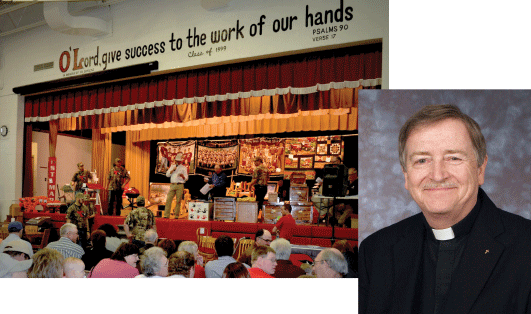
“The carnival auction is an amazing event, with people paying many thousands of dollars for a grain shovel – all to support the needs of the school. This collective effort has enabled this carnival to raise over $300,000 each year!
“In truth, all of these good people may not actively think of themselves as supporting the ‘common good,’ but they are. Many are blessed by their efforts, and their willingness to give of themselves for the good of others,” said Fr. Lantsberger.
Burgwald suggests that this attitude relates to the two great commandments, to love God and to love our neighbor as our self.
“We aren’t supposed to simply be out for number one, that is, for ourselves: we are supposed to be attentive to the needs of others. This is simply another way of expressing the second great commandment that we are called to love our neighbor,” he said.
Motz provides the following common good example from his personal experience.
“In a rural parish (in another diocese) I used to live in, the parish was very small, and there had never been a Catholic school. Some families really wanted their kids’ education to be fundamentally Catholic – with a view towards the formation of the whole person, intellectual and moral, etc. – so some homeschooling moms banded together to cooperate in teaching,” he said.
“Some had special gifts in music, or math, or theology, for example, so it made sense to work together towards their shared vision. As years went on, more families joined in the project and it became a magnetic engine of community life.
“It’s now been integrated into the parish life, essentially as a parish school (though with a novel financial and administrative arrangement), and it’s become a source of vibrancy for what had been, frankly, a ho-hum experience for the average parishioner. And it all started with a small group of people that had a vision for a Catholic education for their kids,” said Motz.
Rutten suggests looking at our families and communities will give each of us plenty of examples of working toward the flourishing of all.
“I’ve seen great examples of the common good lived out in my marriage and in my parish,” he said.
“A year and a half ago I took a new job at Mount Marty College in Yankton, SD. As my wife and I prayed and talked about taking the job one of the key factors had to do with where we would live. Move to Yankton, stay in Sioux Falls or split the difference by living in a community like Beresford perhaps. The common good of our family was at the heart of the reflection and the final decision.
“We chose to remain in Sioux Falls and that I would commute to work. There were many positives to all the options but the principle that we used to think about the decision with was the common good. Simply said, what is best for the whole family, not simply what is best for me, or even me and my wife Laura, but what is best for all of us, including our kids,” said Rutten.
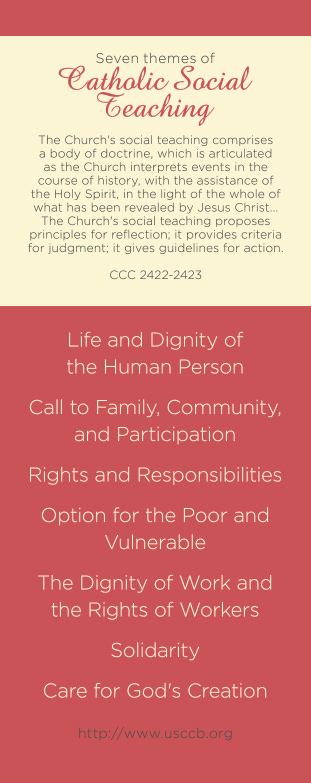 “At my parish, the Cathedral of St. Joseph, I see the common good expressed in the way our parish meets the needs of the many immigrant communities that call it home. You can find the melting pot of the world sitting in the pews of the Cathedral.
“At my parish, the Cathedral of St. Joseph, I see the common good expressed in the way our parish meets the needs of the many immigrant communities that call it home. You can find the melting pot of the world sitting in the pews of the Cathedral.
“What we lack in physical wealth we make up for in culture! The expression of the common good is about reaching human potential in this life and the next. Certainly the parish provides a home and a family of faith for Catholic immigrants from around the world that arrive in Sioux Falls. But we don’t just provide them a community of friendship we provide them with the spiritual tools they next to arrive at their eternal home,” he said
Rutten formerly worked as Faith Formation director at the Cathedral.
“It was common to have large groups of immigrants receiving the sacraments. One time we baptized, gave first communion and confirmed a huge group of our African brothers and sisters. It was amazing as we celebrated the desire for the faith and heaven, our common home and the eternal good we seek.
“The Cathedral parish and immigrant communities express the common good of the Cathedral parish by providing for the spiritual conditions that allow the immigrant communities to reach their fullest potential not just in this life but most importantly in the next,” he said.
That emphasis on the next life is a critical piece of the common good.
“God is the ultimate end of his creatures and for no reason may the common good be deprived of its transcendent dimension…” according to Pope Saint John Paul II in his social teaching encyclical letter, Centesimus Annus. In other words, the common good is not an end in itself, but rather has value in that it helps us achieve eternal life.
Burgwald suggests this approach to understanding that.
“A helpful way to make sense of the idea of the common good is to consider two questions: ‘What’s good for me?’ and then, ‘What’s good for us?’ Both questions are important and necessary, and while they do overlap, there is a distinction between them that we sense when we ask them one after the other.
“Now, to the point about the transcendent dimension of the common good, we can likewise give a simple answer: ‘What is good for us? God!’ That is, God is good for us! He is not only good for me as an individual human being, but He is good for us as a community. Note: that’s not just the community of faith or the community of believers, i.e. the Church. In other words, recognizing and acknowledging God is good for each and every human being as well as for each and every human community,” he said.
“It’s common for married Catholics to say that their task is to get their spouse to heaven. In other words, in the community of the couple, their common good includes their heavenly destiny. And when that community operates in that manner, it thrives and flourishes. The same is true in any human community, whether we acknowledge it or not: our task is to help one another get to heaven. Thus, the transcendent dimension of the common good,” Burgwald said.
Motz notes that humans have often gotten this wrong, but that it is a key element of the common good.
“Our Lord was clear when he said, ‘My kingdom is not of this world.’ Scripture tells us, ‘Justice shall flourish in His time,’ not ours. Vladimir Lenin completely misunderstood St. Thomas More’s famous book, Utopia, and in admiration erected a statue of the saint in Moscow. No disciple of Christ, certainly not the great St. Thomas More, looks for a secular messiah, believing that we humans are sufficient for our own flourishing – if only we order our affairs just so. God took on flesh to be with us. He’s given us a call in this world. Matter matters,” Motz said.
“At an 1884 meeting in Baltimore, Archbishop John Ireland, the Civil War veteran and childhood friend of Bishop Thomas O’Gorman, exhorted his fellow bishops: ‘the most valued aid given to the Republic by the Church … [are] her powerful labors in the cause of religion, of purity, of honesty, of all the heavenly virtues that build up the Christian man and the Christian family.’
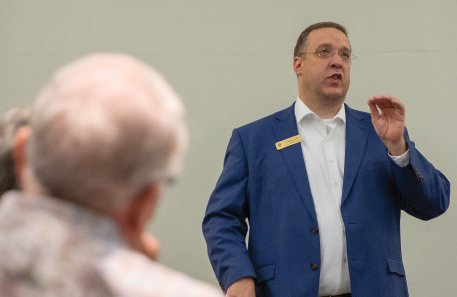
Discipleship Day conference.
“God is our creator and our destiny. This is true not just for the community of believers, but is a universal truth for all human beings. Our vision of the common good must see our families, our parishes, even our political communities, as incubators of ‘heavenly virtue,’ as Archbishop Ireland put it.
“The common good is not good if it excludes God,” said Motz.
Rutten agrees, noting that the challenge for various government agencies leading the charge for the common good is that “they simply can’t take into account the fullness of the human person and eternal good for which we are oriented.”
And that is why the common good is the responsibility of us all.


